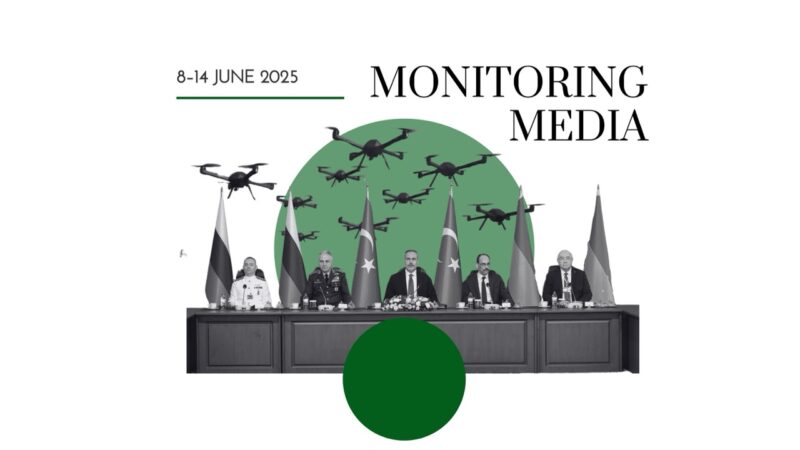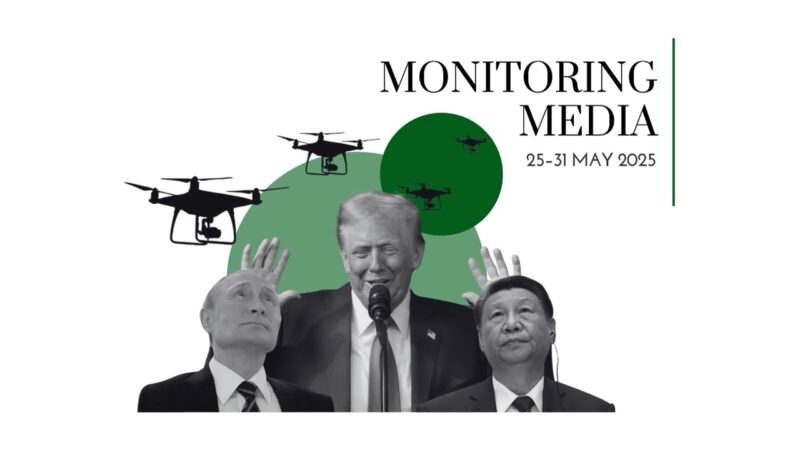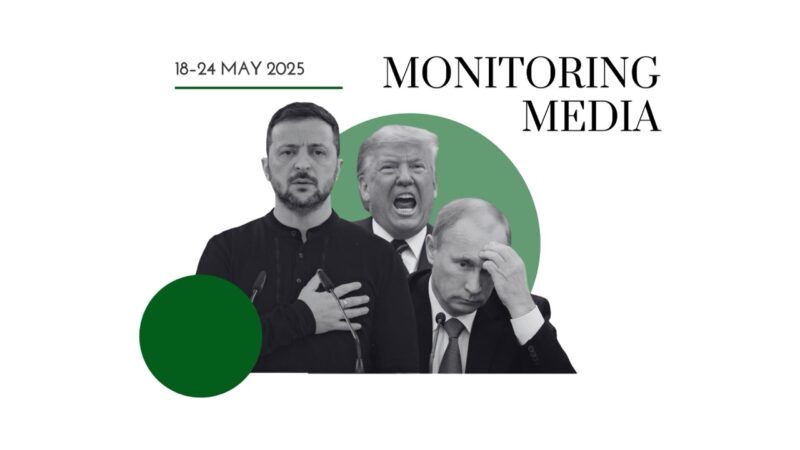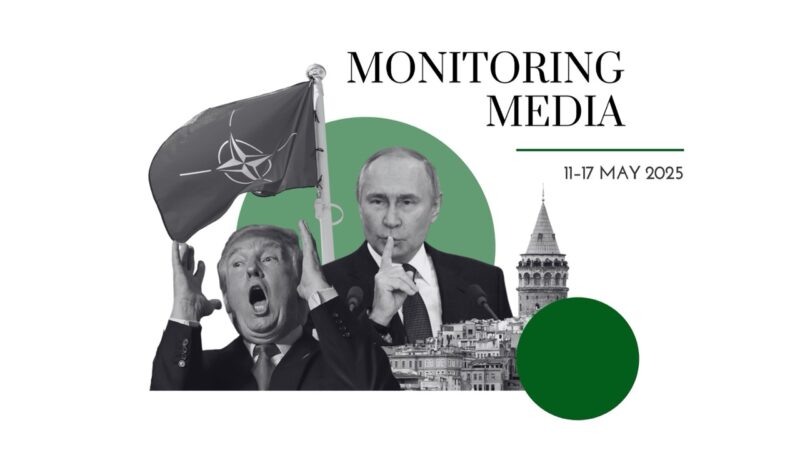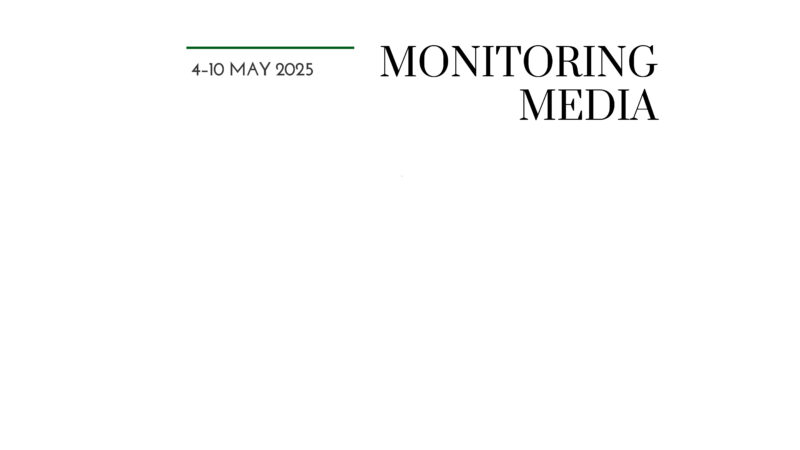Ukrainian naval drones have revolutionized the world

CIUS weekly report on North American media coverage of Ukrainian affairs, 23–29 June 2024
Six publications (The National Interest, The Atlantic, The Wall Street Journal, Foreign Affairs, The Globe and Mail, and Macdonald-Laurier Institute) were selected to prepare this report on how Ukraine has been portrayed in the North American press during the past week. The sample was compiled based on their impact on public opinion as well as on their professional reputation, popularity among the readership, and topical relevance. These publications represent centrist viewpoints on the political spectrum.
This MMS report covers only the most-read and relevant articles about Ukraine, as ranked by the respective North American publications themselves in the past week. Its scope covers promoted articles on home pages and articles from special sections on Ukraine, with the hashtag #Ukraine, from the paper editions of the publications, and about Ukraine from opinion columns and editorials.
Featured topics
- The world and Ukraine: Ukrainian naval drones have revolutionized the world.
- Russia at war: Russia could back China in its aggression against Taiwan; China may be the main winner in Russia’s war against Ukraine; Russian elites have accepted the war against Ukraine.
MMS summaries
Could Russia back China in its aggression against Taiwan? Audrey Oien (National Interest) notes that Washington is concerned about Russia’s possible support for China in its potential invasion of Taiwan, due to two factors: (1) “Russia may aid China based on mutual support, as China has significantly supported Russia’s war efforts in Ukraine by supplying dual-use materials, military equipment, and economic assistance;” and (2) Moscow’s dependence on Beijing: “Russia’s economic dependence on China puts Putin in a vulnerable position, with little room to say ‘no.’” According to the author, Russia’s war against Ukraine can be instructive for Washington to understand how Moscow could support Beijing: “China has helped supply Russia with dual-use material like optics, microelectronics, and drone engines to boost Moscow’s arms production, as well as provided Moscow with cruise missiles and machine tools for ballistic missiles.” In addition to this, “China helped Russia improve satellite and other space-based capabilities, as well as provided satellite imagery.” And finally, Beijing helps Moscow to circumvent sanctions and buys its energy, thus supporting its military machine. According to Oien, “Whether it’s military support during the invasion, economic assistance and support following an invasion, or political and diplomatic support, China’s role in the Sino-Russian partnership and demonstrated support for Russia during the war in Ukraine places it in a position to solicit some form of assistance from Moscow during an invasion of Taiwan.”
China may be the main winner in Russia’s war against Ukraine. Michael Schuman (The Atlantic) argues that China could be the winner in Russia’s war against Ukraine. This war allowed Beijing to achieve two key goals: (1) create significant problems for Western states; and (2) make Russia dependent on China. A protracted war in the centre of Europe is fully in Beijing’s interests: “Xi is, in effect, freeloading off the very US-led global security system he hopes to destroy, in order to replace it with a China-centric world order.” China is doing everything possible to ensure that Russia can continue its war against Ukraine. After all, regardless of how the war ends, Beijing may emerge victorious: “If Putin prevails in his war, Xi has a partner who will have scored a victory against the hated West and promoted the global power of authoritarian regimes. Even if Putin fails to secure such an outright triumph, Xi will have helped Russia drain the U.S. and its allies of military and financial resources, while pulling Putin’s weakened but resource-rich country closer into China’s orbit.” However, a crushing defeat for Russia could pose a serious threat to China. According to Schuman, “For Xi, withdrawing or curtailing support for Russia might hold greater risk than building a closer connection. China has a strong interest in Russia’s political and economic stability. Anything that might jeopardize that status quo—such as retreat or potential defeat in Ukraine, let alone a descent into economic crisis or political chaos in the Russian homeland (as briefly seemed possible when a mutinous Wagner Group marched on Moscow last year)—could present a major security threat along China’s long northern frontier.”
Ukrainian naval drones have revolutionized the world. James Marson (Wall Street Journal) argues that Ukrainian naval drones turned the tide of the ongoing battle for the Black Sea in the Russo-Ukrainian war and led to a fundamental revolution in military affairs. While maritime drones were previously used primarily for surveillance or logistics, today their functions have expanded significantly. Kyiv has turned naval drones into an extremely effective weapon: “Ukraine has sunk or damaged around two dozen Russian ships of all sizes using explosive drones or mines delivered by low-slung craft about the size of a small fishing boat. Sea drones caused severe damage to a bridge from Russia to occupied Crimea that Russia used to supply its forces in Ukraine.” This allowed Kyiv to resume grain exports from Odesa, push the Black Sea Fleet away from Sevastopol, and force Russia to stretch its troops: “Russia has relocated reconnaissance planes, jet fighters, helicopters, aerial drones, and electronic-jamming systems from the front lines to counter Ukraine’s sea drones, easing the pressure on Ukraine’s embattled ground forces.” According to Marson, “The drones are revolutionizing warfare on the seas, much as uncrewed aerial craft have in the skies. They are relatively cheap and hard to detect and defend against. Their use shows how smaller, poorer nations can level the naval playing field against larger, more powerful navies.”
Russian elites have accepted the war against Ukraine. Mikhail Zygar (Foreign Affairs) emphasizes that Moscow’s victories on the battlefield have led Russian elites to reconcile themselves with Russia’s war against Ukraine. At the beginning of Russia’s full-scale aggression against Ukraine, the Russian establishment was against the war, but by the end of 2023 it began to approve: “They have concluded that the invasion, even if they do not support it outright, is a tolerable fact of life. As a result, the odds that they might challenge the Kremlin’s decisions—which were always slim—have gone away entirely.” There are several reasons for the change in the position of Russian elites. Firstly, “they have become more cautious as Moscow cracks down on dissent.” Second, they see no point in protests. Third, they have begun to perceive the invasion in a fundamentally different light: “Today, they believe Russia is prevailing. Moscow, after all, is making steady, if slow, battlefield gains. Ukraine is battered and outgunned, operating with a massive artillery-shell disadvantage. And Western support for Kyiv is waning, jeopardizing Ukraine’s access to military supplies.” The key question for the Russian establishment at the moment is what victory means. For optimists, victory means a major successful offensive on Kharkiv; for pessimists, it means the capture of Kyiv. However, businessmen close to the Kremlin believe that victory is irrelevant, as the war itself is beneficial to the regime: “Putin has grown too fond of the war, which has helped him mobilize society, imprison some dissidents, kill others, and force most of the rest out of the country. The war has also united the elites, who now feel unwanted in the West and see Putin as their only hope for a good life. As a result, the invasion means there is less pressure on Putin than ever before.” According to Zygar, “The notion of an endless war in Ukraine terrifies Russia’s elite, who still hope that the invasion will conclude. They dream of returning as quickly as possible to the peaceful time of February 23, 2022. But for now, they are silent. They see no way back.”
Canada should boost defence spending, Ukraine support with potential Trump return on the horizon. Kelly Craft (Globe and Mail) highlights that as Canada prepares for NATO’s 75th anniversary summit in Washington, concerns are mounting about the potential return of Donald Trump to the White House and its implications for the US–Canada relations. Craft argues that a second Trump presidency would benefit North America and the NATO alliance due to Trump’s record of increasing US defence spending, boosting energy production, defeating ISIS, eliminating Qassem Soleimani, brokering Arab-Israeli peace accords, and preventing Russian invasions during his tenure. Craft also notes that “[Trump] is the only president in the 21st century on whose watch Russia did not invade one of its neighbours.” However, Trump is expected to pointedly continue to demand that allies, especially Canada, contribute more significantly to defence spending. Despite being one of NATO’s wealthiest members, Canada ranks near the bottom in defence spending, allocating only 1.38% of its GDP compared to the agreed-upon 2% minimum: “That’s not going to fly under a second Trump administration,” she writes. The author also highlights the need for increased Canadian support for Ukraine in response to Russia’s aggression. While the US has provided substantial aid to Ukraine, Canada’s contributions have been comparatively modest. The author notes that Trump’s administration supplied Ukraine with lethal aid that the previous Obama-Biden administration had withheld, suggesting Trump’s potential strong support for Ukraine if re-elected. However, she warns that Trump will not tolerate a disproportionate burden on the American people while allies lag in their commitments. Craft urges Canada to bolster its defence spending and aid to Ukraine, arguing this would enhance Canada’s defence industry, create jobs, and modernize its military: “I believe that a second Trump term will strengthen NATO and usher in one of the greatest eras in US–Canada relations—if Canada does its part.”
Moscow and Pyongyang seek strategic alignment. Stephen Nagy (MacDonald-Laurier Institute) reminds readers of Russian leader Vladimir Putin’s visit to Kim Jong Un in North Korea for the first time in 24 years. The move, according to Nagy, is signalling a new alignment between the two isolated regimes. The author outlines four key areas where their interests converge: (1) seeking allies and resources; (2) securing munitions and technological advancements; (3) aligning with other authoritarian states to disrupt the international order; and (4) and leveraging the current geopolitical climate to pressure the US and its allies. Russia’s global standing has plummeted due to its ongoing, unsuccessful invasion of Ukraine, drawing comparisons to the Soviet Union’s failure in Afghanistan. North Korea’s isolation, stemming from its pursuit of weapons of mass destruction and human rights abuses, has led both nations to seek mutual support. The author notes: “Russia will now never be welcome into the family of the EU, nor will Europe ever rely on Russian energy and resources again.” Today’s visit to Pyongyang aimed to secure munitions for Russia and technological advancements for North Korea. This collaboration poses a threat to regional security—especially for Japan, South Korea, and the US, as North Korea aims to overwhelm anti-ballistic missile systems.
Additionally, Russia’s alignment with other authoritarian regimes like China and Iran seeks to undermine democracy, human rights, and international institutions. As the US prepares for potential disruptions during its election year, Nagy warns that “any attempt to outcompete the US and like-minded countries risks destabilizing global peace, prosperity, and security.” The increasing cooperation among these authoritarian states should lead to stronger alliances among democratic nations aiming to uphold the current international order based on the rule of law.
Russia–North Korea pact sparks regional alarm. Bruce W. Bennett (National Interest) writes that recent agreement between Russia and North Korea, involving mutual defence commitments and military-technical cooperation, has sparked significant concerns, particularly regarding potential Russian assistance to North Korea’s military programs. According to the author, “Russia could provide many kinds of assistance to North Korea that would potentially place the South and even the United States at great risk,” including support for North Korea’s nuclear and ballistic missile capabilities. Despite historical precedents of Soviet and Russian aid to North Korea, the full extent and impact of this new agreement remain uncertain. While the mutual defence commitment appears politically symbolic, it raises worries about potential geopolitical maneuvers by both Putin and Kim Jong-un, potentially entangling North Korea in conflicts outside its immediate interests. Moreover, fears persist that this agreement could signal a broader alignment among Moscow, Beijing, and Pyongyang against US influence, despite underlying tensions and divergent strategic goals between Russia and China. South Korea, unsettled by the agreement, has threatened actions in response, reflecting the regional apprehension over heightened North Korean capabilities. As the situation unfolds, strategic implications for US and South Korean interests necessitate careful monitoring and proactive measures to counterbalance potential destabilizing effects in the region, Bennett concludes.
